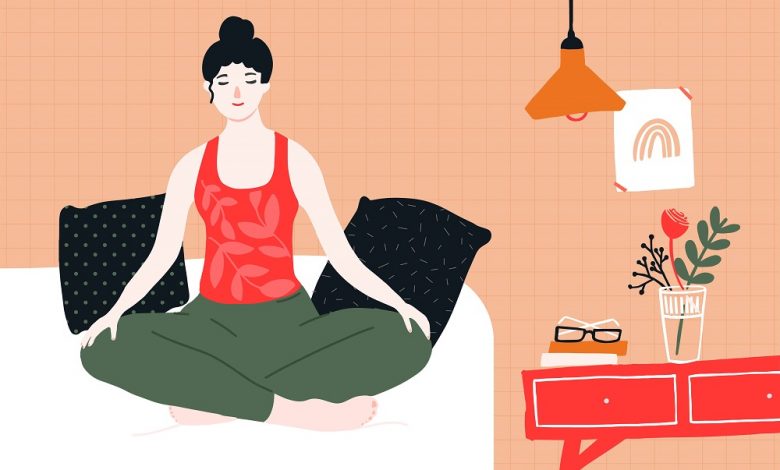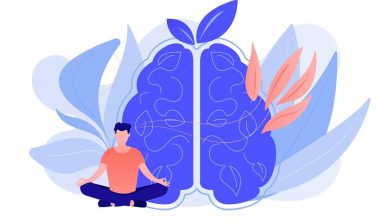A Beginner’s Guide About Mindfulness to Sleep in (2022)

Do you have trouble falling asleep at night? Do you wake up feeling tired and unrested? If so, mindfulness to sleep may be perfect for you! Mindfulness is a practice that can help you focus on the present moment and clear your mind of distractions. When you can focus on the present, it can be easier to fall asleep and get a good night’s rest. This blog post will discuss how mindfulness can help you sleep better at night. We will also provide tips on how to start practicing mindfulness and improve your sleep habits!
Focus on your breath
There are a few different ways to use mindfulness to fall asleep faster. One way is to focus on your breath. When you feel stressed or anxious, it’s easy to forget to breathe deeply and fully. But deep breathing is one of the best ways to relax and fall asleep fast. So try this simple exercise: close your eyes and focus on your breath. Inhale deeply and exhale slowly, focusing on the feeling of the air flowing in and out of your lungs. You can also count each inhales and exhale to help you stay focused.
Focus on a mindfulness mantra
Another way to use mindfulness to fall asleep is to focus on a mantra. A mantra is a word or phrase that you repeat to yourself to help you focus and relax. You can choose any mantra that works for you, but a good one to use when trying to fall asleep is “let go.” Repeat this mantra to yourself as you breathe deeply and let go of all the stress and anxiety of the day.
Trying to imagine going to sleep
Finally, try using visualization to fall asleep. This involves picturing yourself in a calm and relaxing place. It could be a beach, a forest, or anywhere that makes you feel peaceful and at ease. Focus on the details of the scene, and allow yourself to relax into the visualization. This can be an effective way to fall asleep quickly and easily with practice.
Beginners tips mindfulness to sleep
If you’re new to mindfulness, we recommend starting with a guided meditation. This will help you learn the basics of mindfulness and how to apply it to your sleep routine. There are many different guided meditations available online, or you can find one specific to sleep problems. Once you have a basic understanding of mindfulness, you can start applying it to your own sleep routine.
Here are a few tips for using mindfulness to fall asleep faster and more relaxed:
- -Start by focusing on your breath, breathe in and out slowly, and focus on the sensation of the air passing through your nose and mouth.
- -Take a few minutes to relax your body. Start with your feet, and work your way up to your head. Tense and release each muscle group, one at a time.
- -Focus on your thoughts and feelings. Acknowledge any thoughts or feelings, but don’t dwell on them. Just let them pass through your mind without judgement.
- -End your session by focusing on a positive thought or image. Imagine yourself sleeping peacefully, and allow yourself to drift off to sleep.
Also read this article: 10 Best Tips to Achieving Mindfulness for Teens in (2022)
How can mindfulness help you sleep better at night?
Mindfulness can help you sleep better by teaching you to relax and focus on the present moment. When you’re mindful, you’re more likely to let go of stressful thoughts that can keep you awake at night. Mindfulness also helps improve your sleep hygiene habits by creating a bedtime routine and avoiding electronic screens before bed. By incorporating mindfulness into your nightly routine, you can get the quality sleep you need to function at your best.
If you’re looking for more ways to sleep better at night, check out these tips:
- -Create a bedtime routine that includes winding down for 30 minutes before sleep, including reading, yoga, or meditation.
- -Avoid watching television, using the computer, or working on your phone in bed. And these activities can stimulate your brain and keep you awake.
- -Avoid caffeine and alcohol before bed. Caffeine can stay in your system for eight hours, while alcohol can disrupt your sleep cycle.
- -Get regular exercise, but avoid working out close to bedtime. Exercise can help you fall asleep faster, but avoid strenuous activity within two hours of sleep.
- -Create a cool and dark environment in your bedroom. Keep the room at around 65 degrees Fahrenheit and use blackout curtains or an eye mask to block out light.
The benefits of practicing mindfulness before going to bed
There are many benefits to practicing mindfulness before bed. First, mindfulness can help you relax and unwind after a long day. It can also help you clear your mind and get rid of any stress or anxiety that may be keeping you up at night. Mindfulness can also promote better sleep hygiene habits, such as avoiding screens before bedtime and establishing a regular sleep schedule.
Conclusion:
Mindfulness can be a powerful tool for improving your sleep habits. By focusing on the present moment, you can clear your mind of distractions and fall asleep faster and more efficiently. Give mindfulness a try and see how it works for you!
FAQS – Frequently Asked Questions:
Q: What is mindfulness to sleep?
A: Mindfulness to sleep is a technique that can help you fall asleep and stay asleep. It involves focusing on your breath and body sensations to help you relax and drift off to sleep.
Q: How do I practice mindfulness to sleep?
A: There are a few different ways to practice mindfulness to sleep. One way is to focus on your breath and count each inhale and exhale. Alternatively, you can focus on the sensations of your body as you relax. You can also try visualization techniques, such as picturing yourself in a peaceful place or imagining yourself sinking into a soft, comfortable bed.
Q: When should I practice mindfulness to sleep?
A: You can practice mindfulness to sleep at any time, but it’s often recommended before bedtime, and this can help you relax and prepare your mind and body for sleep.
Q: Will mindfulness to sleep help me fall asleep faster?
A: There is no one-size-fits-all answer to this question, as some people may find mindfulness to sleep helpful while others do not. However, many people find that practicing mindfulness to sleep can help them relax and fall asleep more quickly.
Q: Is mindfulness to sleep a suitable replacement for sleep medication?
A: No, mindfulness to sleep is not a replacement for sleep medication. If you are struggling with insomnia or other sleeping problems, please consult your doctor about possible treatments, including sleep medication. Mindfulness to sleep can be used in addition to other remedies but should not be used as a standalone treatment.




